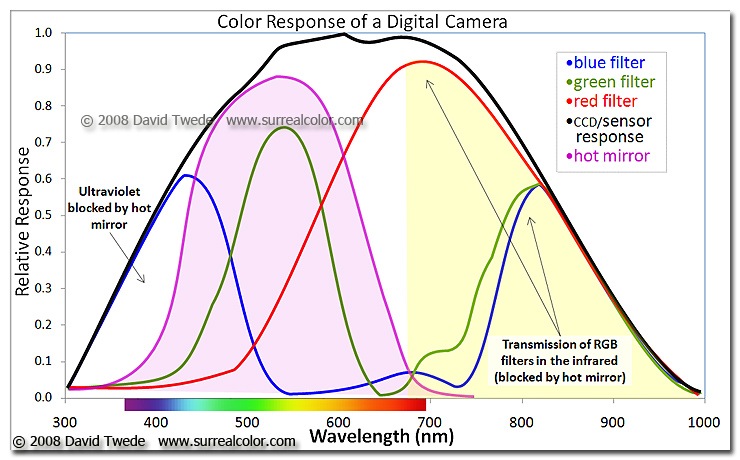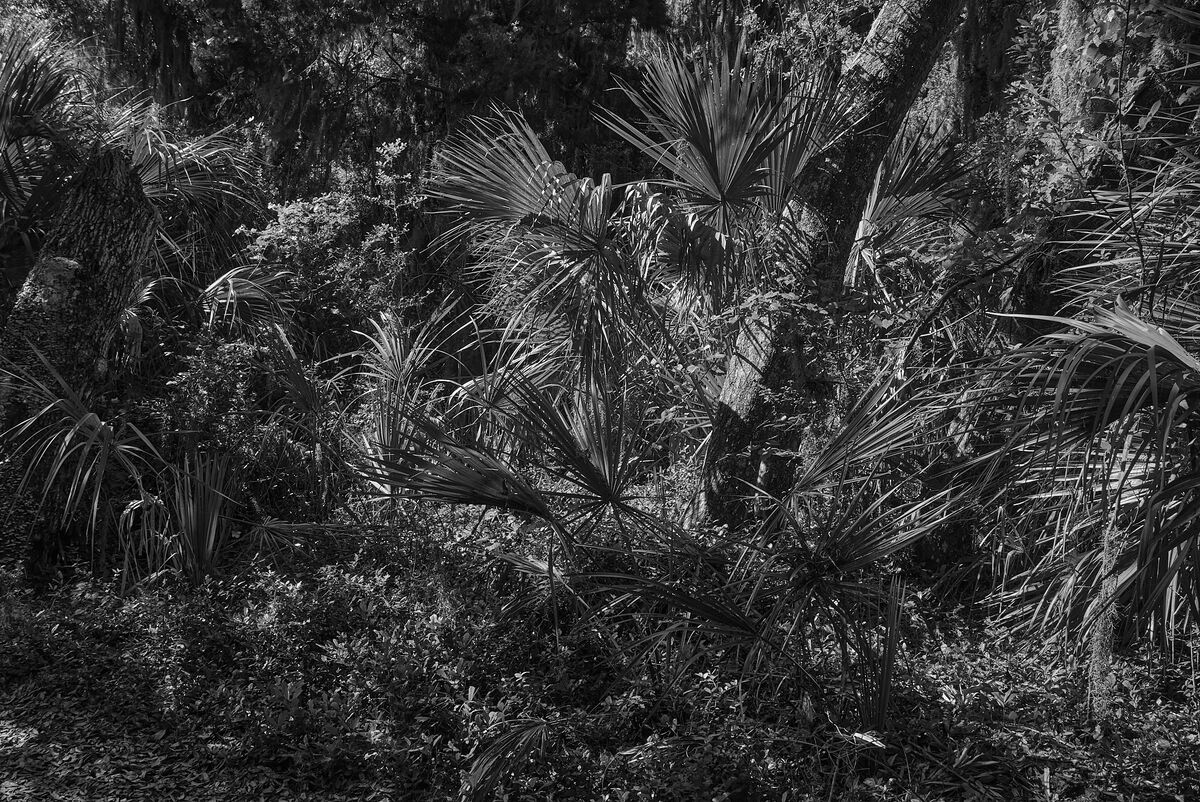monochrome versus color conversion to B&W
Aug 24, 2023 08:44:09 #
I was hot to trot about it for awhile...since I had some older mirrorless hanging around.
But the more I looked into it...not for me.
If you just want to have fun with B&W ... to serious hobby levels...any modern mirrorless will do that job very well...sans conversion.
If you want to shoot for professional grade...buy a dedicated camera built from the ground up for it.
But the more I looked into it...not for me.
If you just want to have fun with B&W ... to serious hobby levels...any modern mirrorless will do that job very well...sans conversion.
If you want to shoot for professional grade...buy a dedicated camera built from the ground up for it.
Aug 24, 2023 09:23:42 #
Ysarex wrote:
Yes, you can still use filters in front of the lens, but that's far less flexible than working with a color image in post. ...
I'm not giving that ease-of-use and flexibility up for what I see as a pretty minor boost in resolution.
I'm not giving that ease-of-use and flexibility up for what I see as a pretty minor boost in resolution.
What you can't do with a camera that still has its CFA is to gain access to the IR colors. They are already blocked by the hot mirror. In fact, some of the UV light is also blocked. The range of wavelengths that can be recorded are normally limited to visible light, about 400nm to 700nm.
What you can do with filters is to limit the range of wavelengths captured in the image over a much larger range, up to almost 1000nm.
Don't dismiss the improvement in sharpness by not demosaicing. You have never seen it first hand. Several of us already have. The increase in sharpness is not "pretty minor" .
Although the camera may capture the same number of pixels, the demosaicing process is known to reduce the effective resolution by half which means that it reduces the sharpness significantly.
In astronomical photography a monochrome sensor can record stars more like points than blurs.

There may be no point in fooling with color in a B&W conversion when the image only shows one color

(Download)
Aug 24, 2023 09:30:28 #
Canisdirus wrote:
If you want to shoot for professional grade...buy a dedicated camera built from the ground up for it.
While most of us can't afford a Leica Monochrom or Phase One, a 24MP full frame like the A7 series can do as well as a 24MP Leica.
Anyone who thinks they are getting something special by reaching higher than 24MP is in denial. That's pretty much the sweet spot when it comes to images for normal photographers, if there are any.
They might want to go higher with color sensors but they will need more expensive lenses.
Aug 24, 2023 09:30:49 #
Ysarex wrote:
There is a discernable difference in resolution/sh... (show quote)
Exactly. I play with the tone sliders in ACR all the time and rarely just desaturate to convert to B&W.
Aug 24, 2023 09:30:50 #
Aug 24, 2023 09:43:07 #
selmslie wrote:
While most of us can't afford a Leica Monochrom or Phase One, a 24MP full frame like the A7 series can do as well as a 24MP Leica.
Anyone who thinks they are getting something special by reaching higher than 24MP is in denial. That's pretty much the sweet spot when it comes to images for normal photographers, if there are any.
They might want to go higher with color sensors but they will need more expensive lenses.
Anyone who thinks they are getting something special by reaching higher than 24MP is in denial. That's pretty much the sweet spot when it comes to images for normal photographers, if there are any.
They might want to go higher with color sensors but they will need more expensive lenses.
Why I said...if you are trying to shoot at a professional level.
Most aren't (except perhaps in their own minds).
For those...shooting in color and post processing in B&W is absolutely fine and enough...and you get much more control over the image.
If you just have an old camera around ... go for it...but I doubt you will note much of a difference.
It's...better...but will not get near a dedicated monochrome camera...so...what's the point of that.
Again...unless you just have a body laying around and are curious.
I was curious...but after some digging...meh. I'll go color and PP.
Aug 24, 2023 09:49:05 #
User ID wrote:
It was somewhat interesting in the last several exact same discussions this year ... but its not interesting anymore. Its just yesterdays news.
The discussion that usually comes up is shooting monochrome with your camera as opposed to converting in post. I haven't seen this discussion of a converted monochrome camera versus converting in post as often.
Aug 24, 2023 09:49:32 #
Canisdirus wrote:
If you just have an old camera around ... go for it...but I doubt you will note much of a difference.
It's...better...but will not get near a dedicated monochrome camera...so...what's the point of that.
It's...better...but will not get near a dedicated monochrome camera...so...what's the point of that.
That's what I did. I had an A7 II available and I converted it to monochrome including full access to the IR wavelengths. It's been instructive and entertaining.
And it does make a discernible difference as I have already posted.
Aug 24, 2023 09:56:52 #
Ysarex
Loc: St. Louis
selmslie wrote:
What you can't do with a camera that still has its... (show quote)
That's all correct, but none of it would tip the scale for me and induce me to give up the control I have in post starting from a color original in exchange for a monochrome sensor. I appreciate it can be attractive to others. I consider a monochrome sensor a big loss and a step backwards if the goal is good quality b&w images.
Aug 24, 2023 10:06:05 #
User ID wrote:
This was somewhat interesting in the last several exact same discussions this year ... but its not interesting anymore. Its just yesterdays news.
Oh, wow. It's so sad to see you back!
Aug 24, 2023 10:26:31 #
selmslie wrote:
That's what I did. I had an A7 II available and I converted it to monochrome including full access to the IR wavelengths. It's been instructive and entertaining.
And it does make a discernible difference as I have already posted.
And it does make a discernible difference as I have already posted.
I'm sure it does...it's middle ground.
I'll take the PP control.
Aug 24, 2023 10:29:53 #
Canisdirus wrote:
I was hot to trot about it for awhile...since I had some older mirrorless hanging around.
But the more I looked into it...not for me.
If you just want to have fun with B&W ... to serious hobby levels...any modern mirrorless will do that job very well...sans conversion.
But the more I looked into it...not for me.
If you just want to have fun with B&W ... to serious hobby levels...any modern mirrorless will do that job very well...sans conversion.
So, if you have a DSLR you’re outa luck? 🤔
Aug 24, 2023 10:46:40 #
srt101fan wrote:
So, if you have a DSLR you’re outa luck? 🤔
No...just a habit. I don't think about dslr's much.
But if you were looking for a middle ground...I'd suggest a DSLR for B&W.
The Pentax K3M3 Monochrome dslr.
If you can't do Leica...that's a good option that is affrodable.
Aug 24, 2023 10:47:20 #
Ysarex wrote:
That's all correct, but none of it would tip the scale for me and induce me to give up the control I have in post starting from a color original in exchange for a monochrome sensor. I appreciate it can be attractive to others. I consider a monochrome sensor a big loss and a step backwards if the goal is good quality b&w images.
You don’t include sharpnesses and smooth tonality as desirable qualities?
Incidentally, it is possible to do a monochrome conversion on an X-Trans sensor. It might eliminate some of the issues you have observed related to demosaicing.
Aug 24, 2023 10:53:06 #
dkeysser wrote:
Thanks, that is sound advice
To whom are you replying? The suggestion is that use always use 'Quote Reply'
If you want to reply, then register here. Registration is free and your account is created instantly, so you can post right away.





